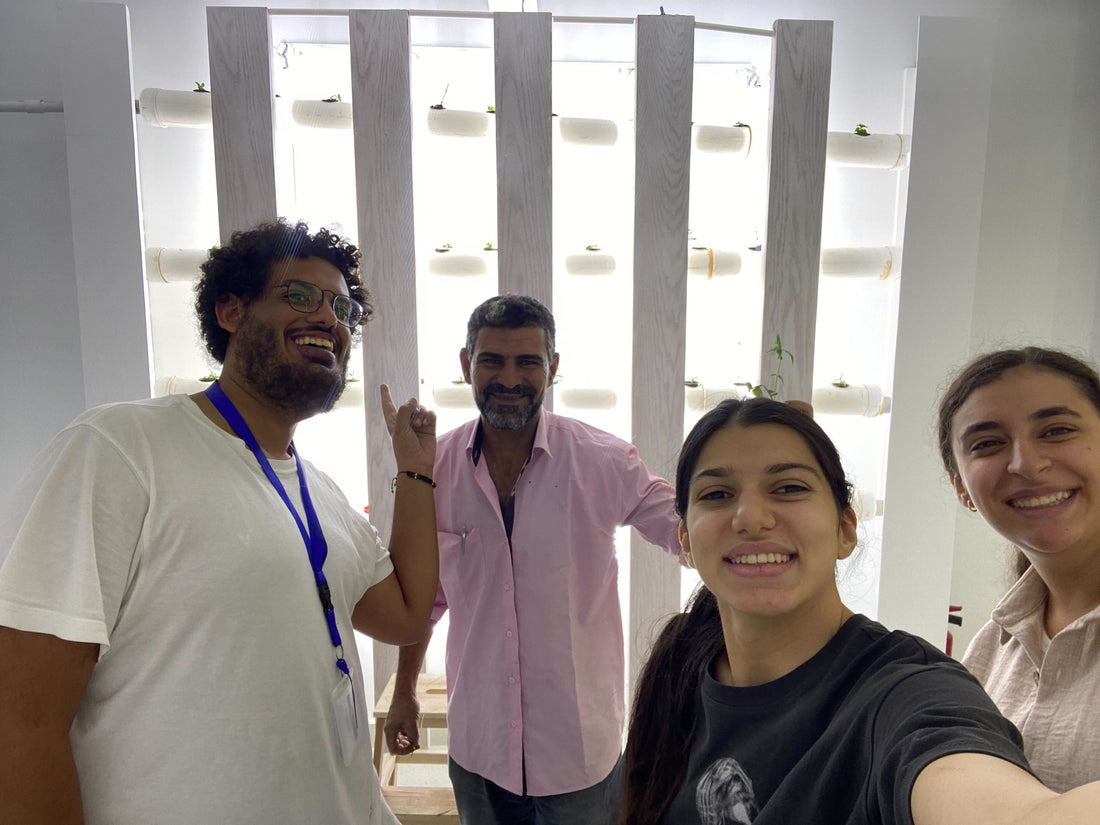Cloning Mentha Piperita L. For Aquaponics System (S3)

At VertiCairo, we are always seeking innovative ways to optimize our farming practices and push the boundaries of sustainable agriculture. Today, we’re excited to share an update on our latest experiment: cloning Mentha piperita L., or peppermint, for our aquaponics System 3 (S3).
Why Peppermint?
Peppermint (Mentha piperita L.) is an aromatic herb known for its refreshing scent and diverse applications in essential oils, culinary uses, and even medicinal remedies. It’s also a robust plant that thrives in both hydroponic and aquaponic systems, making it an ideal candidate for our ongoing experiments in sustainable farming.
The Cloning Process
We began this project by taking cuttings from an already established hydroponic peppermint system within our vertical farm. Using these healthy mother plants as a source, our team of biologists carefully selected the strongest cuttings for cloning. These cuttings were transferred into S3—our third aquaponics system, specially designed for experimenting with different plant species and growth techniques.
Aquaponics, which combines aquaculture (raising fish) and hydroponics (growing plants without soil), creates a symbiotic environment where the fish waste provides nutrients for the plants. This unique system is perfect for testing whether cloned peppermint plants can grow as efficiently, if not better, than their hydroponically grown counterparts.
What We’ll Be Monitoring
To gauge the success of our cloning process, we will be closely monitoring several key factors over the coming weeks:
1. Success Rate of Clones: Not every cutting will develop into a thriving plant. By tracking the percentage of cuttings that successfully root and grow into healthy peppermint plants, we can determine the effectiveness of our cloning techniques.
2. Vegetative Growth: We’ll measure the height, leaf size, and overall biomass of each cloned plant to track its vegetative growth. Healthy vegetative growth is essential for the production of quality peppermint leaves, which are harvested for various uses, including essential oils.
3. Root Growth: Strong root systems are critical for the health and stability of any plant, especially in an aquaponics system where nutrients are absorbed directly from the water. We’ll be closely monitoring root development to ensure that the clones are able to establish a solid foundation in S3.
Why It Matters
At VertiCairo, we’re constantly striving to improve our methods of sustainable farming. By cloning Mentha piperita L., we aim to explore how aquaponic systems can be used to propagate essential herbs more efficiently. If successful, this experiment could pave the way for more extensive cultivation of high-value plants like peppermint, with minimal resource use and a focus on environmental sustainability.
We’re excited to continue our research and share the results with you! Stay tuned as we update you on the progress of our peppermint clones and explore new frontiers in vertical farming and aquaponics.
Want to learn more about our innovative farming techniques? Schedule a tour at VertiCairo and experience the future of sustainable agriculture firsthand!
Why Peppermint?
Peppermint (Mentha piperita L.) is an aromatic herb known for its refreshing scent and diverse applications in essential oils, culinary uses, and even medicinal remedies. It’s also a robust plant that thrives in both hydroponic and aquaponic systems, making it an ideal candidate for our ongoing experiments in sustainable farming.
The Cloning Process
We began this project by taking cuttings from an already established hydroponic peppermint system within our vertical farm. Using these healthy mother plants as a source, our team of biologists carefully selected the strongest cuttings for cloning. These cuttings were transferred into S3—our third aquaponics system, specially designed for experimenting with different plant species and growth techniques.
Aquaponics, which combines aquaculture (raising fish) and hydroponics (growing plants without soil), creates a symbiotic environment where the fish waste provides nutrients for the plants. This unique system is perfect for testing whether cloned peppermint plants can grow as efficiently, if not better, than their hydroponically grown counterparts.
What We’ll Be Monitoring
To gauge the success of our cloning process, we will be closely monitoring several key factors over the coming weeks:
1. Success Rate of Clones: Not every cutting will develop into a thriving plant. By tracking the percentage of cuttings that successfully root and grow into healthy peppermint plants, we can determine the effectiveness of our cloning techniques.
2. Vegetative Growth: We’ll measure the height, leaf size, and overall biomass of each cloned plant to track its vegetative growth. Healthy vegetative growth is essential for the production of quality peppermint leaves, which are harvested for various uses, including essential oils.
3. Root Growth: Strong root systems are critical for the health and stability of any plant, especially in an aquaponics system where nutrients are absorbed directly from the water. We’ll be closely monitoring root development to ensure that the clones are able to establish a solid foundation in S3.
Why It Matters
At VertiCairo, we’re constantly striving to improve our methods of sustainable farming. By cloning Mentha piperita L., we aim to explore how aquaponic systems can be used to propagate essential herbs more efficiently. If successful, this experiment could pave the way for more extensive cultivation of high-value plants like peppermint, with minimal resource use and a focus on environmental sustainability.
We’re excited to continue our research and share the results with you! Stay tuned as we update you on the progress of our peppermint clones and explore new frontiers in vertical farming and aquaponics.
Want to learn more about our innovative farming techniques? Schedule a tour at VertiCairo and experience the future of sustainable agriculture firsthand!